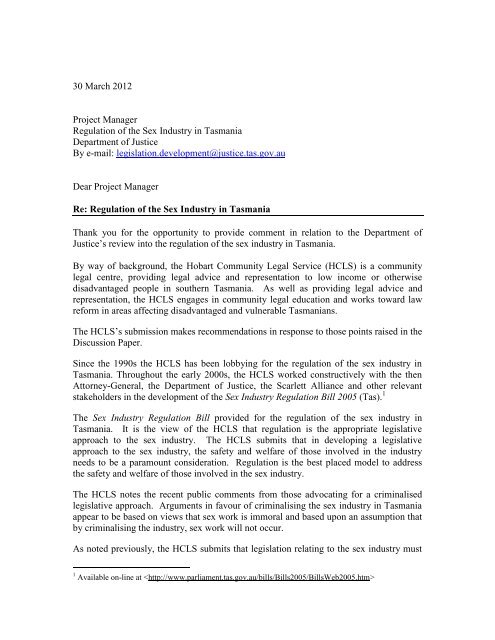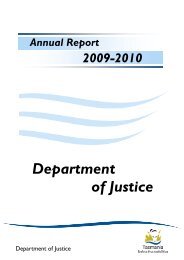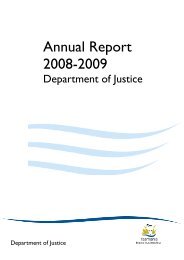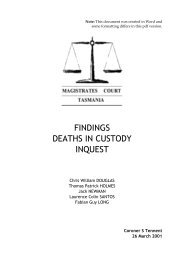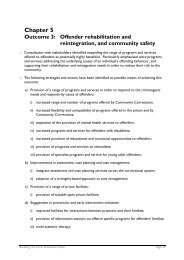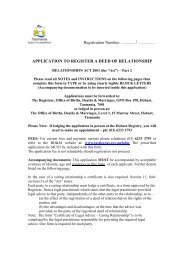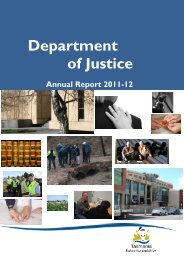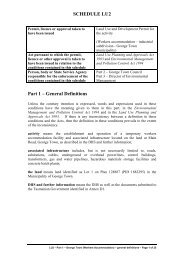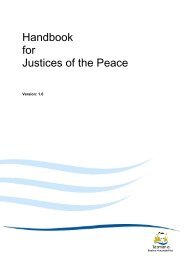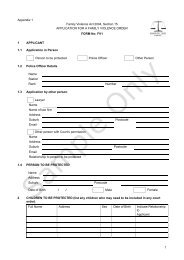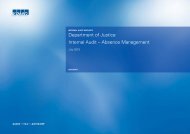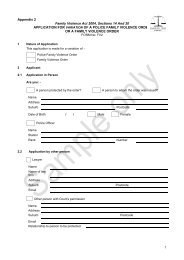Hobart Community Legal Service - Tasmanian Department of Justice
Hobart Community Legal Service - Tasmanian Department of Justice
Hobart Community Legal Service - Tasmanian Department of Justice
Create successful ePaper yourself
Turn your PDF publications into a flip-book with our unique Google optimized e-Paper software.
30 March 2012<br />
Project Manager<br />
Regulation <strong>of</strong> the Sex Industry in Tasmania <br />
<strong>Department</strong> <strong>of</strong> <strong>Justice</strong><br />
By e-mail: legislation.development@justice.tas.gov.au<br />
Dear Project Manager<br />
Re: Regulation <strong>of</strong> the Sex Industry in Tasmania<br />
Thank you for the opportunity to provide comment in relation to the <strong>Department</strong> <strong>of</strong><br />
<strong>Justice</strong>‟s review into the regulation <strong>of</strong> the sex industry in Tasmania.<br />
By way <strong>of</strong> background, the <strong>Hobart</strong> <strong>Community</strong> <strong>Legal</strong> <strong>Service</strong> (HCLS) is a community<br />
legal centre, providing legal advice and representation to low income or otherwise<br />
disadvantaged people in southern Tasmania. As well as providing legal advice and<br />
representation, the HCLS engages in community legal education and works toward law<br />
reform in areas affecting disadvantaged and vulnerable <strong>Tasmanian</strong>s.<br />
The HCLS‟s submission makes recommendations in response to those points raised in the<br />
Discussion Paper.<br />
Since the 1990s the HCLS has been lobbying for the regulation <strong>of</strong> the sex industry in<br />
Tasmania. Throughout the early 2000s, the HCLS worked constructively with the then<br />
Attorney-General, the <strong>Department</strong> <strong>of</strong> <strong>Justice</strong>, the Scarlett Alliance and other relevant<br />
stakeholders in the development <strong>of</strong> the Sex Industry Regulation Bill 2005 (Tas). 1<br />
The Sex Industry Regulation Bill provided for the regulation <strong>of</strong> the sex industry in<br />
Tasmania. It is the view <strong>of</strong> the HCLS that regulation is the appropriate legislative<br />
approach to the sex industry. The HCLS submits that in developing a legislative<br />
approach to the sex industry, the safety and welfare <strong>of</strong> those involved in the industry<br />
needs to be a paramount consideration. Regulation is the best placed model to address<br />
the safety and welfare <strong>of</strong> those involved in the sex industry.<br />
The HCLS notes the recent public comments from those advocating for a criminalised<br />
legislative approach. Arguments in favour <strong>of</strong> criminalising the sex industry in Tasmania<br />
appear to be based on views that sex work is immoral and based upon an assumption that<br />
by criminalising the industry, sex work will not occur.<br />
As noted previously, the HCLS submits that legislation relating to the sex industry must<br />
1 Available on-line at
2<br />
be approached with regard to the safety and welfare <strong>of</strong> those involved in the industry.<br />
The HCLS rejects any attempt to legislate on this issue upon a selective morality basis.<br />
The assumption that legislative prohibition will eradicate sex work is wrong. Prior to the<br />
enactment <strong>of</strong> laws in various Australian jurisdictions aiming to decriminalise aspects <strong>of</strong><br />
the sex industry, the Australian Institute <strong>of</strong> Criminology conducted a study <strong>of</strong> Australian<br />
prostitution laws 2 . After noting that prostitution has existed for centuries, the report<br />
noted that in regard to the criminalisation approach, the approach did not prevent demand<br />
for sex work, and the sex industry continued to exist. The report noted:<br />
Restrictive laws which seek to prohibit behaviour for which there is a substantial<br />
demand and which is pr<strong>of</strong>itable encourage the involvement <strong>of</strong> organised crime<br />
and corruption (Queensland 1989, p. 186).<br />
According to the Fitzgerald Report, the criminalisation <strong>of</strong> prostitution has<br />
encouraged significant criminal activity for several years (Queensland 1989, p.<br />
66). The criminalisation <strong>of</strong> prostitution has resulted in serious health and welfare<br />
problems and has made it difficult for women in the industry to seek help for<br />
these problems. It has led, in many cases, to the legal harassment <strong>of</strong> women while<br />
syndicates and pimps controlling the trade have generally been left untouched.<br />
Furthermore, heavy criminal sanctions have led to greater police corruption and<br />
criminal involvement in prostitution. 3<br />
The Discussion Paper refers to the variation <strong>of</strong> the criminalisation approach that is<br />
currently in effect in Sweden. Under the Swedish law, sex workers are not criminalised,<br />
however, purchasing sexual services is criminalised, as is procuring and pr<strong>of</strong>iting from<br />
sex work. The flaws inherent in the criminalisation approach remain in the Swedish<br />
model. That is, that sex work still exists, but has merely been driven underground at a<br />
cost to the safety and welfare <strong>of</strong> sex workers. Citing a study on the Swedish model,<br />
Harcourt et al write:<br />
Sex workers have complained that they are denied choice <strong>of</strong> work site and clients,<br />
and their work conditions have become more dangerous and difficult. They also<br />
complain that police harass them to give evidence against clients. Prostitution<br />
has not ceased but it has become more covert, and possibly more dangerous as<br />
sex workers „are forced to accept not only more clients (since prices have<br />
dropped) but also more unstable and dangerous clients‟. 4<br />
2 Pinto, Susan, Anita Scandia and Paul Wilson, „No. 22 Prostitution Laws in Australia‟, Australian<br />
Institute <strong>of</strong> Criminology trends & issues in crime and criminal justice, May 1990 (available on-line at:<br />
citing: Queensland 1989, Commission <strong>of</strong> Inquiry<br />
into Possible Illegal Activities and Associated Police Misconduct, Report <strong>of</strong> a Commission <strong>of</strong> Inquiry<br />
Pursuant to Orders in Council, (Fitzgerald Report)<br />
3 Ibid, p 7<br />
4 Harcourt, Christine, Sandra Egger and Basil Donovan, „Sex work and the law‟ Sexual Health 2005; 2:<br />
121-128 at 123, citing: Kulick D, „Sex in the new Europe: the criminalization <strong>of</strong> clients and Swedish fear <strong>of</strong><br />
penetration‟ Anthropological Theory 2003; 3: 199-218.
3<br />
The current legislative approach in Tasmania provides that it is not illegal to be a sex<br />
worker in Tasmania, however, other aspects <strong>of</strong> the sex industry are criminalised.<br />
Under the Sex Industry Offences Act 2005 (Tas) (the Act) it is an <strong>of</strong>fence for a person to<br />
be a commercial operator <strong>of</strong> a sexual services business, and an <strong>of</strong>fence for a person to<br />
knowingly receive „commercial sexual services‟ 5 . The Act also prohibits premises from<br />
being used for commercial sexual services. Under the Act, it is also illegal for sex<br />
workers to work together (with the exception that two sex workers are able to do so in a<br />
partnership arrangement, provided neither controls or manages the other), or as<br />
employees.<br />
The current <strong>Tasmanian</strong> Act creates confusion as to whether sex work is illegal or not.<br />
The Act encourages sex workers to work independently, thereby limiting safeguards that<br />
are available when sex workers are able to work together (for example when dealing with<br />
aggressive, confrontational or violent clients) and makes it difficult for sex workers to<br />
complain if they are not treated properly.<br />
Recommendation 1: The <strong>Hobart</strong> <strong>Community</strong> <strong>Legal</strong> <strong>Service</strong> recommends that the Sex<br />
Industry Offences Act 2005 (Tas) be repealed. The <strong>Hobart</strong> <strong>Community</strong> <strong>Legal</strong> <strong>Service</strong><br />
recommends that the Sex Industry Offences Act 2005 (Tas) be replaced with legislation<br />
that provides for the regulation <strong>of</strong> the sex industry in Tasmania.<br />
Recommendation 2: The <strong>Hobart</strong> <strong>Community</strong> <strong>Legal</strong> <strong>Service</strong> recommends that new<br />
legislation be enacted to provide that registered sexual service businesses are lawful; that<br />
registered sex workers may work as self-employed workers, or within registered sexual<br />
service businesses; and that persons may receive commercial sexual services.<br />
The HCLS maintains its support for legislative regulation <strong>of</strong> the sex industry in<br />
Tasmania. As part <strong>of</strong> the regulatory approach, it is the view <strong>of</strong> the HCLS that both sexual<br />
service businesses and sex workers must register with a government administered agency.<br />
The regulatory approach is the best means <strong>of</strong> attempting to ensure that children are not<br />
involved in the sex industry. Whilst the Discussion Paper notes that registration by itself<br />
cannot guarantee that no child will work in the sex industry 6 , in comparison to the other<br />
legislative approaches, the regulatory approach provides the greatest safeguards to ensure<br />
that children are not involved in the sex industry.<br />
It is through the regulatory approach that the welfare <strong>of</strong> sex workers and clients may be<br />
best realised. Under a regulatory approach, such as that proposed in the Sex Industry<br />
Regulation Bill 2005 (Tas), only fit and proper persons are able to be granted licences and<br />
those licenses are contingent upon adherence to legislative provisions, such as those<br />
relating to sexual health and working conditions. Such adherence benefits both sex<br />
5 Defined as „sexual services provided by a sex worker in a commercial sexual services business‟: Sex<br />
Industry Offences Act 2005 (Tas) s 5(1)<br />
6 Discussion Paper, p 22
4<br />
workers and clients.<br />
The HCLS notes that the registration <strong>of</strong> sex workers is not an approach favoured by the<br />
Scarlet Alliance, an organisation representing and advocating on behalf <strong>of</strong> sex workers in<br />
Tasmania. The HCLS maintains its support for registration <strong>of</strong> sex workers and sexual<br />
service businesses, however. Registration is the most appropriate method to ensure that<br />
sex workers are working within the terms <strong>of</strong> the legislation and are not being exploited.<br />
The HCLS recommends that registered sexual service businesses and sex workers be<br />
given registration numbers, and that such registration numbers must be displayed in any<br />
advertising relating to their sexual service business. This requirement would aid in<br />
preventing unregistered sexual service businesses and workers from operating. To attract<br />
clients, sexual service businesses advertise. A requirement that a registration number<br />
must be displayed in advertising would mean that it would be difficult for unregistered<br />
businesses to attract clients.<br />
Recommendation 3: The <strong>Hobart</strong> <strong>Community</strong> <strong>Legal</strong> <strong>Service</strong> recommends that sex<br />
workers and sexual service businesses must be registered to legally work and operate in<br />
Tasmania. Such registration must be with a government administered agency.<br />
Recommendation 4: The <strong>Hobart</strong> <strong>Community</strong> <strong>Legal</strong> <strong>Service</strong> recommends that sex<br />
workers and sexual service businesses be issued with a registration number upon<br />
registration.<br />
Recommendation 5: The <strong>Hobart</strong> <strong>Community</strong> <strong>Legal</strong> <strong>Service</strong> recommends that the new<br />
legislation contain provision as to when an applicant will be refused registration. The<br />
<strong>Hobart</strong> <strong>Community</strong> <strong>Legal</strong> <strong>Service</strong> recommends that generally, registration should be<br />
refused where an applicant for registration has committed an <strong>of</strong>fence under legislation<br />
regulating the sex industry.<br />
Recommendation 6: The <strong>Hobart</strong> <strong>Community</strong> <strong>Legal</strong> <strong>Service</strong> recommends that the<br />
registration number must be displayed in any advertising relating to the sexual services<br />
business.<br />
The Sex Industry Regulation Bill 2005 (Tas) contained a number <strong>of</strong> legislative<br />
requirements and <strong>of</strong>fence provisions, designed to protect sex workers, the clients <strong>of</strong> sex<br />
workers, and the community more generally. These requirements and <strong>of</strong>fences<br />
provisions, contained in sections 21-29 <strong>of</strong> the Sex Industry Regulation Bill 2005 (Tas)<br />
were designed to ensure safe workplaces, that safe sex practices were followed, and that<br />
children were not involved in the sex industry. The HCLS recommends that a new law<br />
providing for the regulation <strong>of</strong> the sex industry in Tasmania contain such legislative<br />
requirements and <strong>of</strong>fence provisions.<br />
Recommendaiton 7: The <strong>Hobart</strong> <strong>Community</strong> <strong>Legal</strong> <strong>Service</strong> recommends that the new<br />
legislation contain legislative requirements and <strong>of</strong>fence provisions designed to protect sex<br />
workers, clients and the community. The <strong>Hobart</strong> <strong>Community</strong> <strong>Legal</strong> <strong>Service</strong> recommends
5<br />
that the legislative requirements and <strong>of</strong>fence provisions contained in section 21-29 <strong>of</strong> the<br />
Sex Industry Regulation Bill 2005 (Tas) provide a suitable model for the drafting <strong>of</strong> such<br />
provisions.<br />
The Discussion Paper also raises the issue as to how planning law should apply to sexual<br />
service businesses.<br />
The HCLS maintains its support for the position that all businesses must be subject to the<br />
same planning laws. Sexual service businesses must be treated in the same way as any<br />
other business under relevant planning law.<br />
The HCLS maintains its position <strong>of</strong> rejecting proposals to create „buffer zones‟, or linear<br />
measurements, within which sexual service businesses cannot be located. Exclusion<br />
zones may make the legalisation <strong>of</strong> sexual service businesses unworkable. As noted in<br />
the Discussion Paper, it may be extremely difficult to find areas in Tasmania cities that<br />
are not near places frequented by children. 7 Exclusion zones may also result in a<br />
proliferation <strong>of</strong> sexual service businesses within close proximity <strong>of</strong> one another, creating<br />
a „red light district‟. Additionally, there may also be a greater risk <strong>of</strong> harm to sex<br />
workers should they be forced into industrial areas with little security or lighting.<br />
The HCLS submits that the location <strong>of</strong> businesses should be decided upon according to<br />
standard planning law principles, as opposed to set moralistic judgements.<br />
Recommendation 9: The <strong>Hobart</strong> <strong>Community</strong> <strong>Legal</strong> <strong>Service</strong> recommends that the Land<br />
Use Planning and Approvals Act 1993 (Tas) apply to sexual service businesses in the<br />
same way it applies to any other business.<br />
In 2009 the „Report on the Review <strong>of</strong> the Sex Industry Offences Act 2005‟ 8 was tabled<br />
in the <strong>Tasmanian</strong> Parliament. In addition to recommending that the Parliament consider<br />
the suitability <strong>of</strong> alternative legislative models for the sex industry in Tasmania, the<br />
Report also recommended that:<br />
1. A pamphlet outlining the legal status <strong>of</strong> sex work be developed for distribution to sex<br />
workers;<br />
2. A dedicated community-based sex worker health initiative be established; and<br />
7 Discussion Paper, p 23<br />
8 Available on-line at:<br />
6<br />
3. “Occupation” be included as a protected attribute under section 16 <strong>of</strong> the Anti-<br />
Discrimination Act 1998 (Tas). 9<br />
The HCLS takes this opportunity to endorse the recommendations made in the Report.<br />
Should new legislation be enacted to provide for the regulation <strong>of</strong> the sex industry,<br />
information outlining the legal status <strong>of</strong> sex work must be effectively communicated to<br />
sex workers.<br />
A program dedicated to sex worker welfare is also needed. The HCLS notes the<br />
<strong>Department</strong> <strong>of</strong> Health and Human <strong>Service</strong> advice contained in the Report that Tasmania<br />
is the only jurisdiction in Australia without a dedicated sex worker support service. 10<br />
The HCLS is also supportive <strong>of</strong> the inclusion <strong>of</strong> “occupation” as a protected attribute in<br />
section 16 <strong>of</strong> the Anti-Discrimination Act 1998 (Tas). Whilst the protected attribute <strong>of</strong><br />
“lawful sexual activity” already contained in section 16 <strong>of</strong> the Anti-Discrimination Act<br />
1998 (Tas) ought to be enough to protect sex workers from discrimination on the basis<br />
that they are sex workers, the additional protection that would be afforded by including<br />
“occupation” as a protected attribute would be beneficial.<br />
Should you wish to discuss any aspects <strong>of</strong> our submission further, please do not hesitate<br />
to contact us on (03) 6223 2500.<br />
Yours sincerely<br />
<strong>Hobart</strong> <strong>Community</strong> <strong>Legal</strong> <strong>Service</strong><br />
Per:<br />
Jane Hutchison<br />
Manager<br />
9 Report <strong>of</strong> the Review into the Sex Industry Offences Act 2005, available on-line at:<br />
,<br />
pp 20-21<br />
10 Ibid at 17


